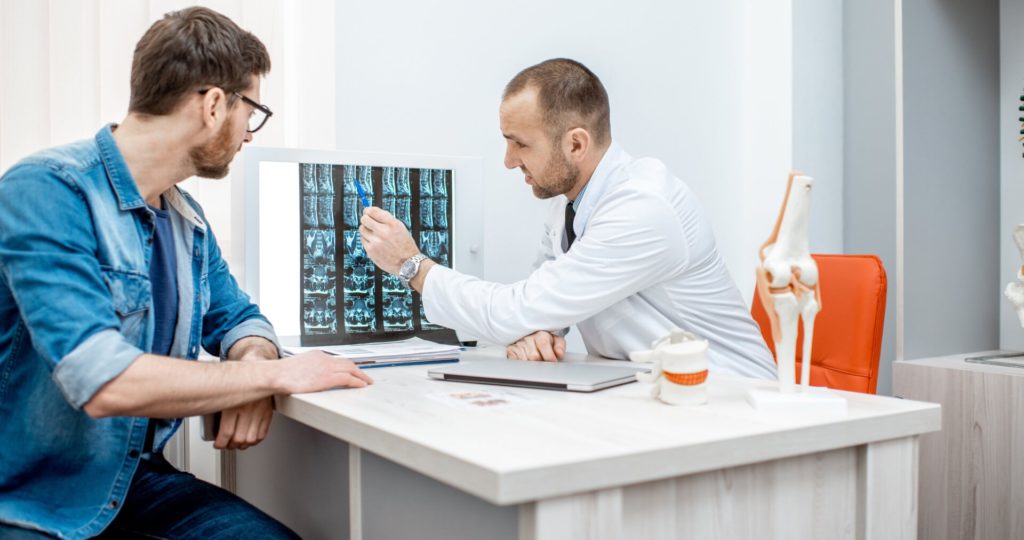
After a car accident, the most common complaints are headaches. Research shows that up to 80% of people will experience some form of a headache after accident car afterward. While the cause of these headaches can vary, some common factors contribute to them. In this blog post, we’ll explore why you may get a headache after a car accident and what you can do to find relief.

Car accidents are a common cause of headaches.
Car accidents are a common cause of headaches due to brain injuries, such as post-traumatic headaches, headache after accident car, migraine headaches, whiplash headaches, and pinched nerve headaches related to pain in the neck. Headache symptoms often appear following a car accident, caused by a sudden and violent jolt or the intense force from a motor vehicle collision. It is critical for people who have been in a car accident – even minor ones – to seek medical evaluation if they experience headache pain or other symptoms such as neck stiffness, sharp headache pain, vision disturbances, sound sensitivity, and slurred speech as these can be signs of serious injury. A headache after a vehicle accident may involve long-term persistent headaches, commonly known as post-concussion syndrome, even months or years later. These chronic headaches often require specialized medical care and legal intervention to help with emotional distress, lost wages, and mounting medical bills. With proper diagnosis and treatment from personal injury attorneys and pain care specialists, many accident victims can avoid permanent brain damage or further complications from their auto accident injuries.

The headache you experience after an accident can vary depending on the severity.
After suffering a headache from a vehicle accident, it is vital to understand how it can vary depending on the accident’s severity. Symptoms may include painful migraines and/or neck pain and stiffness. While some headaches following a minor vehicle accident may resolve on their own, headaches after a more serious auto collision could reflect nerve damage resulting in persistent headache pain and neurologic deficits such as memory loss, post-concussion syndrome, or visual disturbances. When any headache after an accident persists longer than three days, specialized medical attention should be sought with a qualified head-pain specialist as there may be underlying injury sites not found in conventional imaging studies, such as broken bones or soft tissue injuries. Ignoring headaches from car accidents can lead to further complications, debilitating headaches that last an entire week or more, lost wages due to inability to work, and higher medical bills for proper treatment. It is also essential for individuals involved in motor vehicle accidents to contact their injury attorney and insurance company to discuss legal compensation for their certain injuries sustained in the violent jolt of the motor vehicle collision.

Common symptoms include neck pain, dizziness, and nausea.
Headaches after a car or vehicular accident, also known as post-traumatic headaches, are a common problem that can arise after any vehicular collision. Common symptoms include pain in the neck, dizziness, and nausea but the headache intensity and related symptoms vary depending on the individual’s injury site and the traumatic event (motor vehicle accident). PTH can cause severe head pain, leading to chronic headaches, chronic headaches, migraines, or even occipital neuralgia. In addition to these symptoms, headache sufferers have cited visual problems, memory loss, intense headache pain, and stiff neck. Any level of vehicular accident, from minor to major, can result in personal injury ranging from broken bones to soft tissue damage that may warrant legal compensation through an auto accident lawyer or a personal injury attorney. Medical treatment by a health care professional is essential for proper diagnosis and treatment – ignoring the headache could lead to further complications such as post-concussions syndrome – so victims should not delay in seeking medical care to avoid additional debilitating headaches and other long-term effects associated with brain injuries such as brain fracture or permanent motor-skill loss.

If you are experiencing any aftermath symptoms, seeking and seeing a doctor is necessary as soon as possible.
After a car accident, headache is a common symptom, especially when the accident is severe and causes traumatic head injuries. Experiencing headache symptoms after a car crash can indicate more significant problems, such as brain damage or injuries, soft tissue damage, neck and/or back pain, and even spinal nerves fractures. Suppose you have been involved in a vehicular collision and are experiencing headache-related symptoms such as neck or shoulder pain, extreme fatigue, dizziness, slurred speech, vision issues, sleep problems, or memory loss. In that case, it’s important to seek medical care from an experienced headache care specialist. Neglecting these symptoms can result in further health complications and possibly even brain fractures if left untreated. As such, it’s crucial that people who have experienced any of these symptoms after a car accident get immediate medical attention so that their injury site can be appropriately diagnosed and treated to avoid more serious medical conditions down the line.

Available treatments can help relieve your symptoms and improve your condition and status of life.
Car accidents can cause a headache after an accident due to a traumatic brain injury (TBI) or post-traumatic headache. These headaches can range from mild to severe and are often associated with headache symptoms such as pain in the neck and migraines. Furthermore, the sudden and violent jolt experienced in a motor car collision can cause severe injury, including headache pain due to head/brain trauma and muscle strain—known as whiplash headaches. Headaches after a car accident may be caused by soft tissue injuries or fractures to the skull, broken bones, or even nerve injuries on the scalp or at the site of the injury. Such headaches may present as persistent headache, occipital neuralgia headaches, or even intense migraine headaches along with visual disturbances—all of which are indicative of a possible brain injury and should not be ignored if they persist beyond one week. It is important that those experiencing sustained headache pain call seek medical care immediately rather than ignore it, as further complications can arise without proper treatment. Medical attention is also necessary to determine legal compensation for medical bills, lost wages, and other damages related to the car accident due to any other personal injuries sustained in the event—something which should not be done without consultation from a professional personal injury attorney who specializes in motor vehicle accidents.
How to treat headaches from car accidents
Treating a headache caused by a car accident requires identifying the cause and taking appropriate action. As an accident victim, you must see your doctor for a complete examination to ensure no underlying medical conditions.
If the cause of the headache is from whiplash or other neck trauma, stretching exercises, massage, and physical therapy may help. If muscle strain is the cause, anti-inflammatory medications such as ibuprofen or naproxen can be taken to reduce swelling and pain.
Your doctor may also recommend preventive measures for future headaches, such as wearing a neck brace or using an adjustable headrest in your car. In some cases, chiropractic care or acupuncture may be recommended to treat headaches caused by car accidents.
When a headache is accompanied by other symptoms such as dizziness, blurry vision, numbness, or difficulty speaking, seek a medical expert immediately. Follow your doctor’s advice and treatment plan for the best results. Additionally, ensure you are getting enough rest and drinking plenty of fluids to reduce the intensity and frequency of your headaches. With proper treatment, you should be able to reduce or eliminate the pain from your car accident-related headache.
If headaches from a car accident are not addressed promptly and properly, they can lead to further complications that may require more intensive treatment.
Headache after a car accident but didn’t hit their head.
Following a minor car accident, it is possible to experience a headache even if you did not hit your head. This headache can be caused by whiplash or other trauma when the body jerks abruptly from the impact force. It can also be caused by psychological stress and emotional distress due to the accident.
Headaches due to car accidents may include a throbbing headache, pain in the neck, head pressure, and sensitivity to light or sound. The intensity of the headache can range from mild to severe and can last anywhere from a few hours to several days or weeks. Migraine headaches are also common after car accidents, particularly if there are pre-existing factors such as a family history of migraines.
If you experience a constant headache following a car accident, it is crucial to seek medical advice as soon as possible. Your doctor can help evaluate your symptoms and determine the cause of the pain. Depending on the severity, treatments may include medications for pain relief, muscle relaxants, physical therapy, or relaxation techniques. Further testing may be necessary to rule out more serious problems such as concussions or brain injuries.
It is also important to remember that headache after a car accident can have mental and emotional effects in addition to physical symptoms. Talk with your doctor about any symptoms of anxiety or depression you may be experiencing, and consider seeking support from a counselor or therapist. With the proper treatment, it is possible to reduce or eliminate headaches caused by car accidents.
Headache after rear-end collision
Having been involved in a rear-end collision and now having a headache, it’s important to seek medical advice as soon as possible. A headache after an auto accident can be caused by various factors, including whiplash, concussion, bruising, or brain injury. Even if the impact was relatively minor and no other serious injuries appeared, it is important to visit a doctor as soon as possible.
The physician will likely ask questions about the accident and your symptoms during your appointment. The examination may include a neurological assessment, diagnostic imaging scans like MRI or CT scans (or both), balance tests, and other types of assessments depending on the severity of your injuries.
Suppose the physician diagnoses you with a concussion or other head injury. In that case, treatment may include medication to reduce pain and swelling and physical therapy to help restore range of motion and mobility. Depending on the severity of your injuries, surgery may be necessary. In many cases, rest and time are encouraged following a rear-end collision with a headache.
To prevent long-term complications from a head injury, it’s important to follow your doctor’s instructions. This includes monitoring for symptoms such as headaches, dizziness, or confusion and scheduling regular follow-up appointments. Getting plenty of rest and avoiding activities that require strenuous physical effort or can worsen symptoms is also important.
Headaches months after a car accident
Car accidents commonly result in headaches, a frequent discomfort for those involved. If you were in a collision, it’s not uncommon to experience headaches months later. The pain may be due to whiplash or other soft-tissue injuries caused by the impact force. It could also be related to mental stress and emotional trauma associated with the accident.
Headaches after a car accident should not be ignored. If you experience chronic headaches, you must see a doctor for an evaluation and diagnosis. An expert or a doctor can determine the cause of your headache and recommend appropriate treatment options such as medication, physical therapy, or lifestyle changes. Treatment can help reduce pain, improve sleep, and help you return to your normal activities.
If the headaches are severe or occur frequently, it’s vital to contact an experienced car accident attorney who can advise you on possible legal options. An attorney can help you understand what types of compensation, such as medical bills and lost wages, may be available. Additionally, a lawyer can ensure that you receive fair compensation for your physical and emotional injuries. Legal action may also help you get the justice and closure that can be important after a distressing and traumatic experience such as a car accident.
Headaches indicate something is wrong and should not be dismissed or ignored. If you were a car accident victim and suffered from headaches months later, it’s important to seek medical and legal help. Don’t wait until the pain becomes unbearable and your condition worsens. The sooner you seek help, the better your chance of restoring your health after a serious accident.
If you need assistance, contact a knowledgeable car accident attorney who can guide you through the legal process and help you get the compensation you deserve.

Post-traumatic headache
Post-traumatic headache is a common symptom of traumatic brain injury (TBI). It is characterized by persistent, disabling headaches caused by trauma to the head or neck area that may irritate the greater occipital nerve. PTH can go undiagnosed and have a significant impact on quality of life. The most effective treatments involve psychological strategies such as cognitive behavioral therapy (CBT), medication management, and lifestyle changes. In most cases, standard procedure or surgery may be necessary to address any underlying physical causes of the headache. With proper treatment and self-care, most people with PTH can achieve significant relief from their headaches and lead more normal lives.
Unfortunately, many people living with PTH have difficulty finding where to turn for help or how to manage their symptoms. Education about PTH can empower patients to advocate for themselves and seek the resources they need to obtain effective treatment. In addition, support from family and friends can play an important role in helping those living with PTH cope with their condition.
Living with PTH can be challenging, but understanding the condition and recognizing that effective treatments are available can make it easier to manage and create a better quality of life. With proper care, those living with PTH can find relief from their symptoms and lead more fulfilling lives.
It is important for people living with PTH to know that they are not alone. Support groups, online communities, and other resources are available to provide education and emotional support for those dealing with PTH. Finding an experienced healthcare provider who understands the condition is essential for receiving the best care. People living with PTH can live more meaningful, productive lives with proper treatment, lifestyle changes, and support from family and friends.
By understanding post-traumatic headaches and the treatment options available, those living with PTH can take control of their symptoms and live more fulfilling lives.
The goal is to relieve intense headaches caused by a traumatic brain injury. With the help of an experienced healthcare provider and lifestyle changes, people living with PTH can find relief from their symptoms and lead more meaningful lives. With the right support, people living with PTH can take control of their condition and lead more productive, fulfilling lives.
Headache after a car collision is a common traumatic brain injury symptom, but it doesn’t have to be debilitating. With proper treatment, lifestyle changes, and support from family and friends, those living with PTH can achieve significant relief from their symptoms and lead more fulfilling lives.
With the right care and support, people with PTH can find relief from their symptoms and live more fulfilling lives.
Post-traumatic headaches can be difficult to manage, but with the right treatment and self-care, those living with PTH can find relief from their symptoms and live more fulfilling lives. By understanding post-traumatic headaches and the available treatment options, patients can take control of their condition and lead more productive, meaningful lives. With proper care and support from family, friends, healthcare providers, and other resources, those living with PTH can find relief from their headaches and lead more meaningful lives.
Living with a PTH doesn’t have to be debilitating. With the right treatment and self-care, people living with PTH can take control of their symptoms and lead more fulfilling lives.
Headache after car accident diagnosis
Your doctor will likely begin the diagnosis process by performing a physical examination and asking about your symptoms, the circumstances of the accident, and your medical history. They can also run imaging tests like X-rays, and CT scans to assess any potential signs of damage to the head or neck. In some cases, they may also order blood tests to check for any signs of infection or other conditions causing the headache.
Your specific headache treatment plan is determined by the underlying cause but could include rest, over-the-counter pain medications, physical therapy, prescription medications, or even surgery if necessary. Your doctor can help you determine which treatment is best for your situation.
Following your doctor’s advice and seeking treatment for any persistent headaches following a car accident is important. Doing so can help you find relief from pain and prevent further complications.

Headache and neck pain you may experience after a car accident.
Headache and neck pain are the most common symptoms experienced after a car accident. The pain in the neck can range from mild soreness to more severe, debilitating pain that requires medical action. It is important to seek medical care if you experience discomfort in your neck following an accident, as this could indicate a severe injury such as a whiplash.
Headaches are also a common symptom experienced following an accident ranging from dull aches to sharp, stabbing pains that may be accompanied by nausea or dizziness. These headaches can often be caused by head trauma, such as hitting the steering wheel or dashboard in a collision. It is crucial to seek medical advice if you experience any headache following an accident, as it could signify a concussion or other more serious injury.
If you are experiencing them after a car accident, it is vital to get evaluated by a medical professional as soon as possible. The doctor will assess your symptoms and determine if further treatment is needed. Treatment may include rest, ice/heat applications, over-the-counter medications such as ibuprofen or acetaminophen, physical therapy, chiropractic care, massage therapy, or prescription medications. Your doctor will make the best treatment recommendation based on the severity and nature of your symptoms.
Taking care of yourself is paramount following a car accident, though you do not feel like you have been injured. Don’t hesitate to seek medical advice for any lingering symptoms, such as fracture headaches that may indicate a more severe injury that requires immediate treatment.
After a car accident, it’s essential to be aware of the potential headaches that may develop. While some people have no symptoms after an accident, others may experience minor or more severe headaches depending on the severity of their accident. Symptoms include headache, dizziness, and nausea. If you experience any of these symptoms, seeking medical attention is essential. Fortunately, there are treatments available that may be able to help reduce or even eliminate your headache-related complaints and improve your overall quality of life. At Wattel & York Attorneys at Law in Seattle, we understand how hard managing the aftermath of an accident can be and care about giving you back peace of mind. Contact us today if you want help relieving your compensation worries from car accidents or need more information. We care for you!

 253.471.1075
253.471.1075